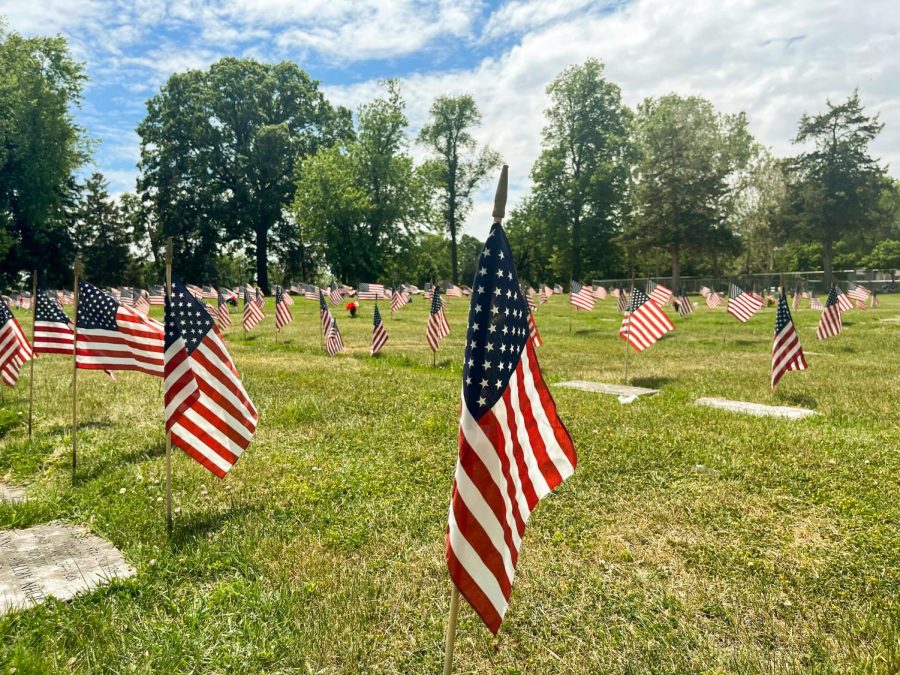Memorial Day: History, traditions, controversy
American flags placed at headstones of US military veterans at Mt. Hope Cemetery in Urbana.
May 29, 2023
With temperatures rising across the continental United States, late May often seems to mark the shift from spring to summer. For many, the summer doesn’t feel initiated until Memorial Day — an unofficial opportunity to commemorate the beginning of the season of hot dogs, pool days and popsicles.
Beyond its administrative function as the first day of operation for many public pools, the holiday has also begun to occupy an entirely new cultural role in recent decades. Memorial Day has become a consumerist tradition marked by doorbuster deals on everything from mattresses to video games and designer handbags.
A holiday steeped in history, Memorial Day’s corporate observance is an issue of controversy among United States military veterans and their supporters. Ceremonially, the origins of the holiday can be traced back to the end of the Civil War.
Then known as Decoration Day, the original iteration of Memorial Day was proclaimed on May 30, 1868 by John Logan, commander in chief of the Grand Army of the Republic — an organization honoring Army, Navy and Marines veterans who fought and died for the Union during the costly conflict.
In 1873, the holiday was first officially recognized as a government holiday by the state of New York. Following World War II, celebration of Memorial Day was expanded to commemorate all U.S. veterans who have lost their lives in service, not only those who died in the Civil War.
Get The Daily Illini in your inbox!
In 1971 — over 100 years after Memorial Day’s initial observance — the federal government shifted the date of Memorial Day from May 30 to the last Monday in May, enabling the enshrinement of an annual three-day weekend for many into U.S. law.
This move continues to be met with criticism from veterans’ organizations who claim that the standardized vacation and accompanying cultural shift of Memorial Day’s observance pull attention from its original significance.
While many engage in the holiday through travel, relaxation and shopping, some take the opportunity to reflect upon not only the numerous lives lost in conflict, but the foreign policy decisions and societal structures that lead to the losses.
In a 2018 article about the holiday and its history from Jacobin Magazine — a democratic socialist publication — Contributing Editor Jonah Birch wrote that the nature of global conflict in the United States is that the rich and powerful decide whether or not to send working class soldiers into active war.
“The master class has always declared the wars; the subject class has always fought the battles,” Birch said in the article. “The master class has had all to gain and nothing to lose, while the subject class has had nothing to gain and all to lose — especially their lives.”
The sentiment that the system deserves to be criticized is echoed across the aisle, with conservative voices also expressing concern with the loss of lives in military conflict. Hannah Cox, libertarian conservative commentator, tweeted on Monday morning that Memorial Day is an occasion to recognize the ills of the military-industrial complex.
“Memorial Day is for U.S. victims of the Military Industrial Complex and war,” Cox said in the tweet. “The only way to honor them is to ensure more victims are not needlessly created.”
Many also observe Memorial Day by paying tribute to those who have lost their lives in military service — including politicians and other public figures.
In a traditional wreath laying ceremony on Monday morning, President Joe Biden gave a heartfelt address commemorating the holiday, citing a “sacred obligation” to take care of active service members and their families following global conflicts.
“Let us never forget the lives these flags, flowers and marble markers represent,” Biden said. “A mother, a father, a son, a daughter, a sister or spouse — a friend, an American. Every year we remember, every year it never gets easier.”
The president, who lost his son Beau Biden to cancer after he returned from serving in the Iraq War, said that the holiday is a particularly difficult time for his family.
“Tomorrow marks eight years since we lost our son, Beau,” Biden said. “He didn’t perish on the battlefield — it was cancer that stole him from us a year after he deployed as a major in the United States Army National Guard in Iraq. As it is for so many of you, the pain of loss is with us every day, but particularly sharp on Memorial Day.”






